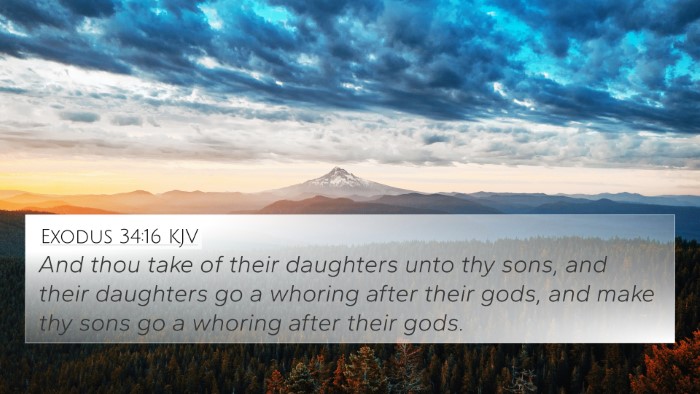Understanding Judges 3:6
Verse: Judges 3:6 - "And they took their daughters to be their wives, and gave their daughters to their sons, and served their gods."
Summary of the Verse Meaning
Judges 3:6 presents a pivotal moment in Israel's history where intermarriage with pagan nations leads to spiritual decline. The verse indicates that the Israelites, in defiance of God's commandments, engaged in relationships with the inhabitants of the land, ultimately resulting in the worship of foreign gods. This highlights a recurrent theme in the Old Testament regarding the dangers of compromising faith for cultural assimilation.
Insights from Public Domain Commentaries
Matthew Henry
Matthew Henry emphasizes that the Israelites' decision to marry among the Canaanites reflects a departure from their covenant obligations. In his view, this act symbolizes a broader spiritual compromise. The relationships established through marriage were not merely social; they had profound spiritual ramifications, leading to the forsaking of the true God in favor of idols.
Albert Barnes
Albert Barnes notes that the practice described in Judges 3:6 was in direct contradiction to God’s commandment not to intermarry with pagan nations. He explains that the Israelites, seeking to blend into Canaanite culture, undermined their identity as God's chosen people. This commentary cautions against the allure of conforming to surrounding cultures instead of adhering to divine principles.
Adam Clarke
Adam Clarke elaborates on the repercussions of these marriages, outlining that the resulting worship of Canaanite deities invoked God’s anger towards Israel. Clarke indicates that these unions brought about a spiritual decline and led Israel into a cycle of sin and judgment, calling readers to reflect on the consequences of turning away from God's precepts.
Bible Verse Cross-References
- Exodus 34:16: Warns against giving one's daughters to the inhabitants of the land.
- Deuteronomy 7:3-4: Commands strict avoidance of intermarriage with pagan nations.
- Joshua 23:12-13: Reminds Israel of the dangers of mingling with other peoples.
- 2 Corinthians 6:14: Advises believers against being unequally yoked with non-believers.
- 1 Kings 11:1-2: Accounts the downfall of Solomon due to foreign wives leading him to idol worship.
- Nehemiah 13:23-27: Nehemiah’s reform against intermarriage emphasizes the ongoing issue of spiritual compromise.
- Malachi 2:11: Condemns treachery against God by marrying daughters of foreign gods.
Thematic Bible Verse Connections
Judges 3:6, viewed through the lens of thematic connections, serves as a crucial lesson on maintaining fidelity to God amidst cultural pressures. This verse underscores recurring biblical motifs of faithfulness and the consequences of infidelity.
Thematic Exploration
The faithfulness of God is often juxtaposed with humanity's unfaithfulness. The theme of spiritual compromise resonates throughout both the Old and New Testaments, illustrating a profound spiritual truth: associations with ungodly influences can lead to abandonment of faith.
Cross-Referencing Biblical Texts
The act of cross-referencing various scriptures allows us to see the broader narrative of God's desire for His people to remain distinct and devoted. The connection between Judges 3:6 and scriptures such as Deuteronomy 7:3 reinforces this ideal and warns against the pitfalls of cultural assimilation.
Practical Application
For modern readers, Judges 3:6 highlights the importance of discernment in relationships and influences. Believers are encouraged to reflect on their associations and ensure they uphold their values in faith amidst societal pressures.
Bible Cross-Reference Guide
Tools for cross-referencing, such as a bible concordance or bible cross-reference system, can enhance understanding of connections between scripture, allowing for a more comprehensive study of biblical themes and their implications.
Conclusion
Judges 3:6 serves not just as a historical account but as a cautionary narrative about the consequences of spiritual compromise. Reflecting on this verse alongside its cross-references can lead to deeper insights into the importance of maintaining one's faith in God amidst external influences.








